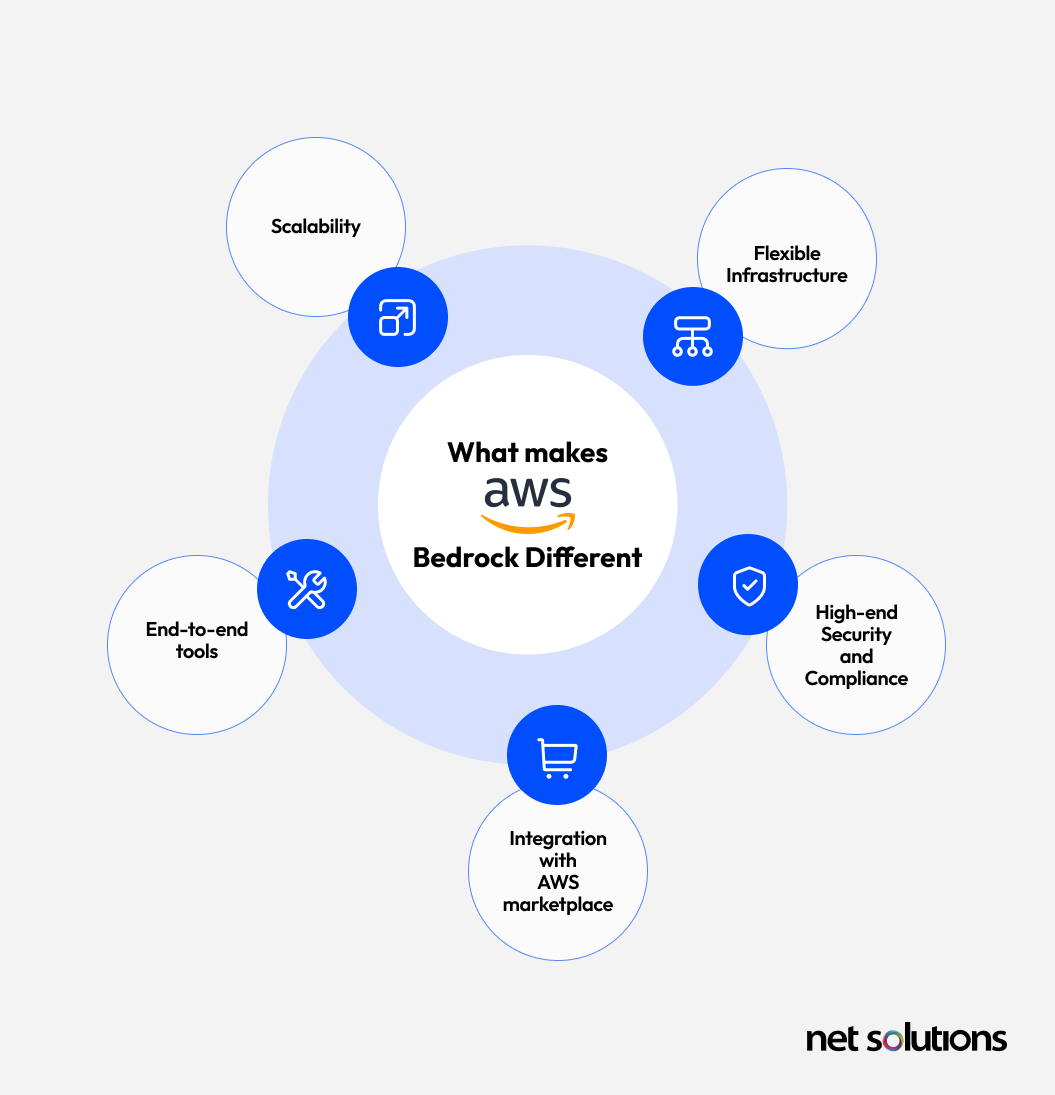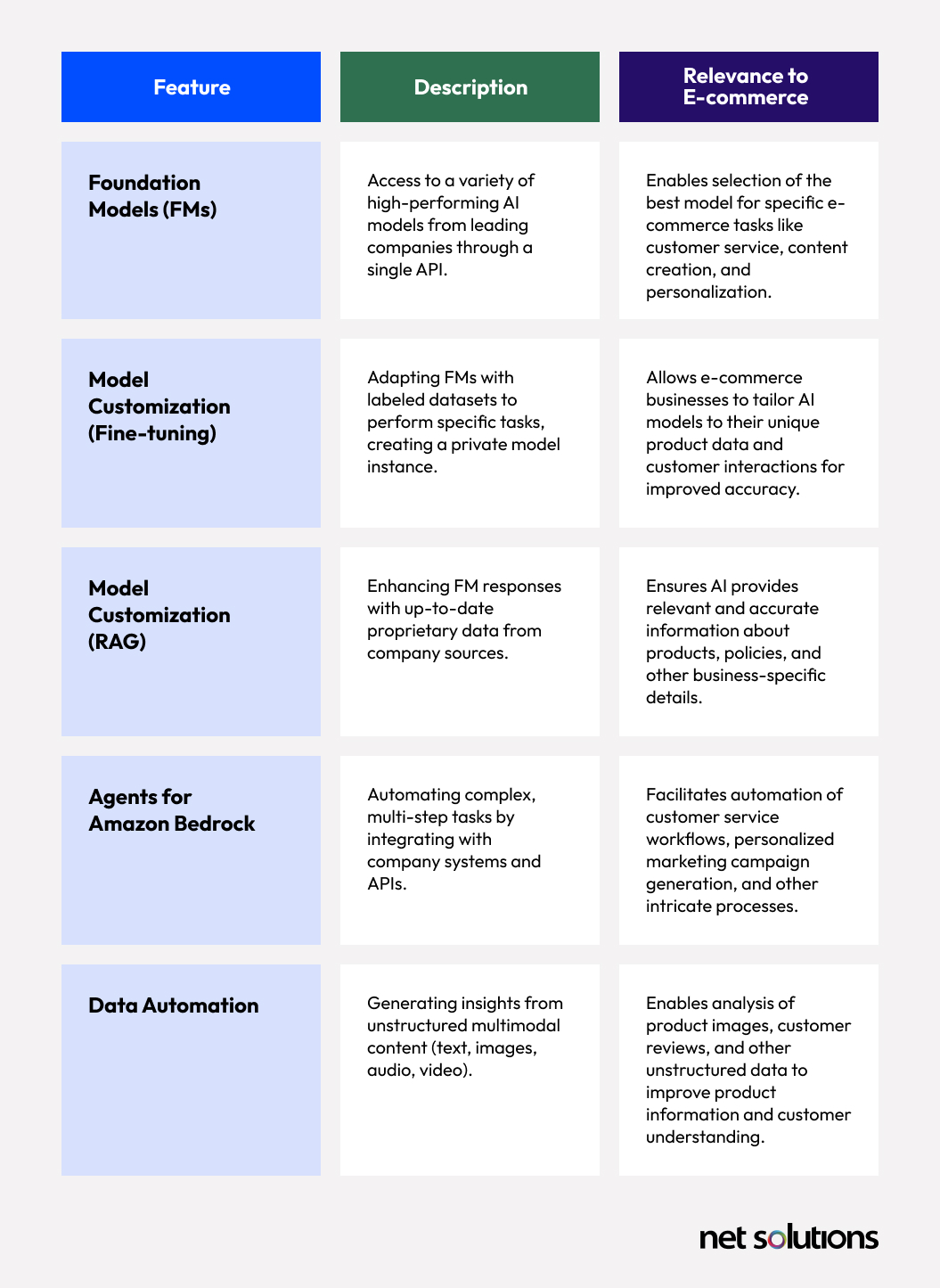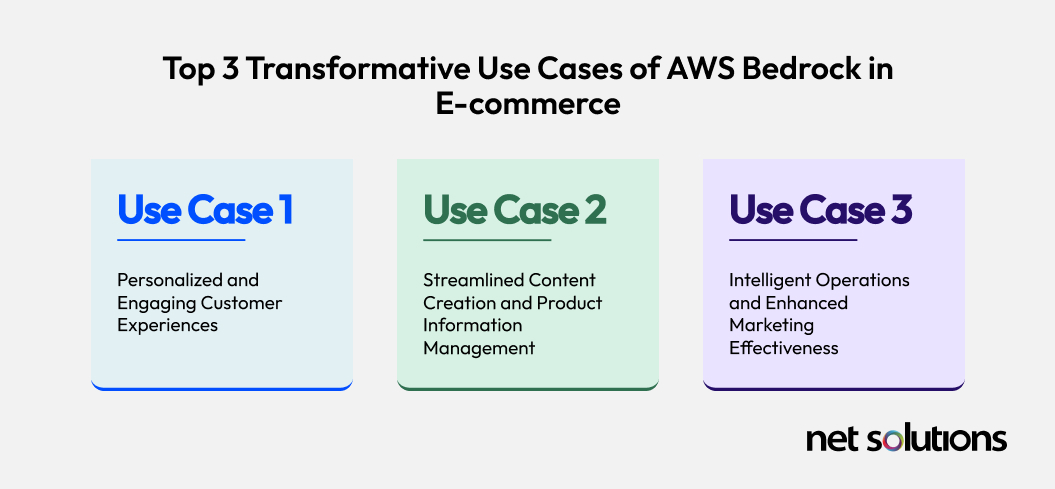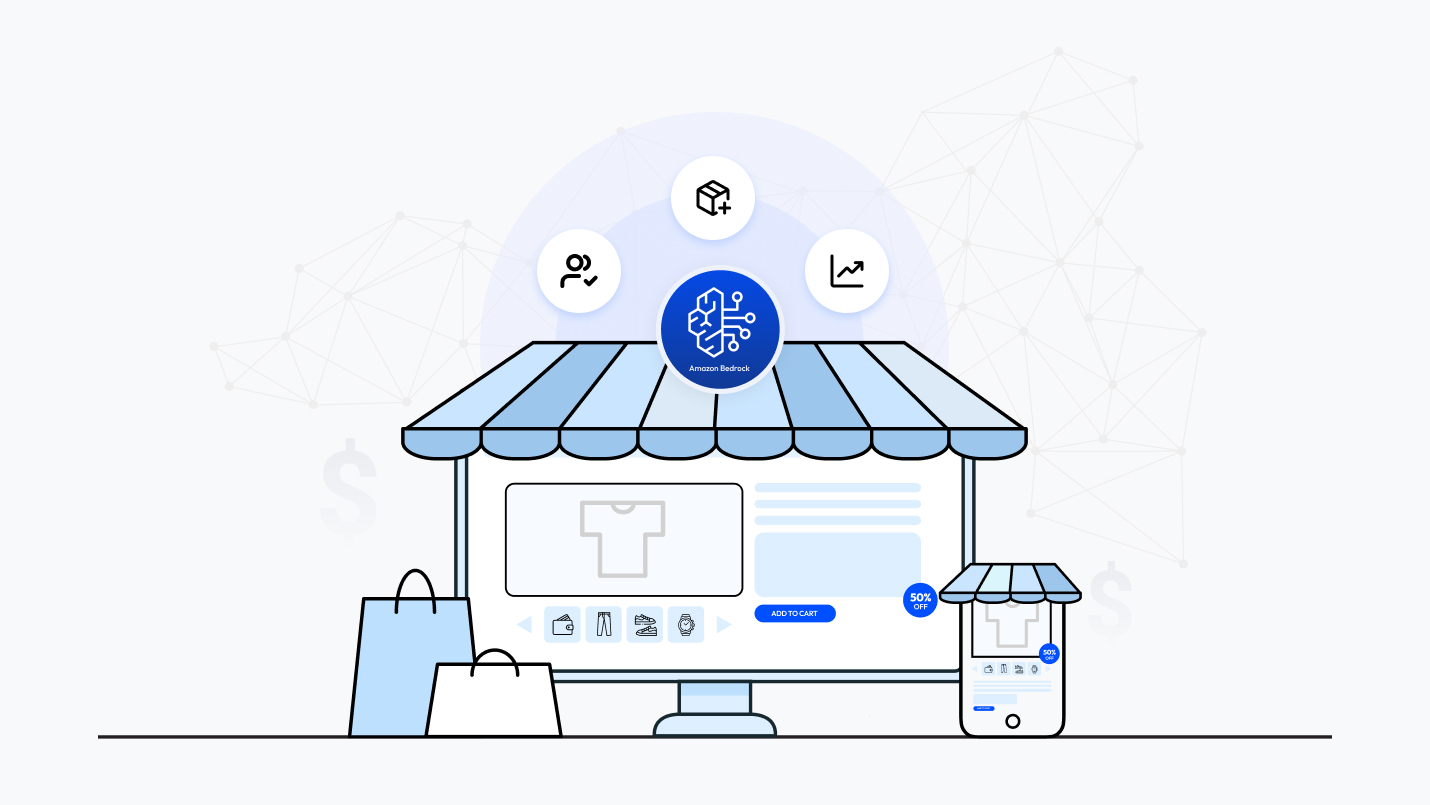The e-commerce landscape is undergoing a significant evolution, driven by the rapid advancements in artificial intelligence. Generative AI, in particular, is emerging as a powerful force, offering unprecedented opportunities for businesses to enhance their operations and customer interactions. AI for eCommerce is not merely an incremental improvement; it represents a fundamental shift in how online retail can function, providing brands with greater control, fostering stronger customer engagement, and enabling the delivery of highly personalized experiences at scale. This transformative potential allows early adopters to gain a considerable competitive advantage in the digital marketplace.
At the forefront of this revolution is AWS Bedrock, a fully managed service designed to simplify the process of building and scaling generative AI applications. By offering a selection of high-performing foundation models (FMs) from leading AI companies through a unified API, Bedrock removes many of the traditional barriers to entry. AWS Bedrock use cases span across multiple facets of an e-commerce business, from personalized recommendations to automated content creation.

Moreover, this service provides the necessary tools to experiment with and evaluate various FMs, customize them privately using proprietary data, and construct intelligent agents capable of executing complex business tasks. The “fully managed” nature of Bedrock is particularly significant for e-commerce businesses, as it eliminates the need for deep machine learning expertise or extensive infrastructure management.
Demystifying AWS Bedrock: Key Features for E-commerce Transformation
AWS Bedrock distinguishes itself through a comprehensive suite of features tailored to meet the diverse needs of e-commerce businesses. At its core, Bedrock provides access to a wide array of Foundation Models (FMs) from industry-leading AI companies, all accessible through a single API. This extensive selection allows businesses to experiment with and choose the most suitable model for their specific applications. For instance, models like Claude excel at understanding context and generating human-like responses, making them ideal for customer service applications. Conversely, Stable Diffusion is adept at creating custom product visuals, while Amazon Titan models offer versatility in text generation, code generation, and sentiment analysis. This diverse offering ensures that e-commerce businesses can select the optimal AI engine for tasks ranging from conversational interfaces to visual content creation and marketing material generation.
A critical aspect of using AI in eCommerce effectively in e-commerce is the ability to tailor models to specific business needs. Bedrock facilitates this through Model Customization, offering techniques such as fine-tuning and Retrieval Augmented Generation (RAG). Fine-tuning allows businesses to adapt FMs using their own labeled datasets, creating a private, customized version of the model accessible only to them. This is invaluable for tasks requiring domain-specific knowledge. RAG enhances the accuracy and relevance of FM responses by equipping them with up-to-date proprietary information.
Beyond model customization, Bedrock introduces Agents for Amazon Bedrock, which enable the automation of complex tasks across various company systems and data sources. These agents can execute multi-step processes, such as answering intricate customer inquiries or processing orders, by dynamically interacting with enterprise systems and APIs. By analyzing user requests, agents can automatically call the necessary APIs and data sources to fulfill the request, all while maintaining robust security and privacy. This capability provides a powerful tool for e-commerce businesses to automate intricate workflows, such as resolving customer service issues that necessitate accessing multiple internal systems or orchestrating personalized marketing campaigns driven by detailed customer data.
Furthermore, Amazon Bedrock Data Automation simplifies the process of extracting valuable insights from unstructured multimodal content, including documents, images, audio, and videos. This feature can automate workflows related to intelligent document processing, media analysis, and RAG in a cost-effective and efficient manner. For e-commerce, this functionality can be particularly useful for automatically extracting key attributes and features from product images, analyzing customer reviews to gauge sentiment and identify recurring themes, and processing diverse forms of unstructured data to gain actionable insights across various business functions.

Top 3 Transformative Use Cases of AWS Bedrock in E-commerce
AWS Bedrock offers a multitude of applications for e-commerce businesses. However, three use cases stand out for their transformative potential: personalized and engaging customer experiences, streamlined content creation and product information management, and intelligent operations with enhanced marketing effectiveness.

Use Case 1: Personalized and Engaging Customer Experiences
In today’s competitive e-commerce landscape, delivering personalized and engaging customer experiences is paramount. AI-powered eCommerce plays a significant role here, and AWS Bedrock provides several tools to achieve this, notably through intelligent chatbots and virtual assistants, hyper-personalized product recommendations, and enhanced search functionality.
Intelligent Chatbots and Virtual Assistants powered by Bedrock can revolutionize customer support by offering instant and personalized responses. Agents for Amazon Bedrock enable the creation of sophisticated chatbots capable of context-aware interactions. These AI assistants can handle a wide range of customer needs, from answering product inquiries and processing returns to providing sizing recommendations, ultimately leading to significant reductions in customer support costs. Furthermore, these chatbots can engage in natural, human-like conversations, understand individual user preferences, and efficiently retrieve and recommend relevant products from the catalog.
Moving beyond basic interactions, Hyper-Personalized Product Recommendations powered by Bedrock offer a significant advantage over traditional methods. Bedrock can analyze vast quantities of customer data to provide product suggestions tailored to individual preferences, leading to increased conversions and greater customer satisfaction. Generative AI’s ability to analyze customer behavior allows for the prediction of future actions and product interests, enabling a more proactive and relevant recommendation strategy. This goes beyond simple collaborative filtering by considering not only past purchases but also browsing behavior, stated preferences, and even the context of the current interaction. This nuanced understanding allows for more effective upselling and cross-selling opportunities, as customers are presented with products they are genuinely more likely to be interested in.
Finally, enhanced AI eCommerce search powered by Bedrock can significantly improve product discovery. Generative AI in e-commerce search engines utilizes natural language processing and machine learning to understand the underlying intent behind customer queries. This allows AI-powered search solutions to deliver more accurate and personalized search results compared to traditional keyword matching. The future of e-commerce search will likely see the increased adoption of conversational search tools powered by generative AI, enabling customers to find products using natural language, as if speaking to a human. Bedrock’s capabilities can power search functionalities that understand the semantic meaning of customer queries, including synonyms and related concepts, thereby providing more relevant results and enhancing the overall shopping experience.
Use Case 2: Streamlined Content Creation and Product Information Management
Managing and creating compelling content and product information is a significant challenge for e-commerce businesses. AWS Bedrock offers powerful solutions for Automated Product Description Generation, Dynamic Marketing Content Creation, and Intelligent Image Editing and Generation.
Automated Product Description Generation powered by generative AI tools can utilize text inputs and image tags to create both short and long-form product descriptions. Bedrock can automate this process, generating SEO-friendly text for a vast inventory by analyzing product attributes such as material, features, and intended use. Furthermore, Bedrock can enhance existing basic product descriptions or even generate entirely new ones based on the objects identified in product images using services like Amazon Rekognition. Automating the creation of high-quality, SEO-optimized product descriptions with Bedrock can lead to substantial savings in time and resources, particularly for e-commerce businesses with extensive product catalogs.
Dynamic Marketing Content Creation is another area where Bedrock can provide significant value. Generative AI can assist in creating various marketing materials, including posters, taglines, social media posts, and even video content. Brands can leverage AI to generate ad copy, social media updates, and videos that are aligned with current market trends, thereby maximizing audience engagement. Bedrock Agents can be specifically employed to generate personalized creative content tailored to specific marketing objectives and individual customer preferences. For example, an e-commerce company can utilize Bedrock to generate personalized email marketing campaigns where product recommendations and promotional content are uniquely tailored to each recipient’s past purchase history and browsing activity.
In the realm of visual content, Bedrock can facilitate Intelligent Image Editing and Generation. AI-powered tools can automate tasks such as background removal and lighting adjustments, significantly improving the quality and consistency of product visuals. Generative AI can also create entirely new product images, marketing graphics, and social media visuals, automating many branding and design tasks. By assisting in the creation of visually appealing and consistent product imagery and marketing materials, Bedrock helps enhance the overall brand image and improve the customer’s visual experience on the e-commerce platform. For example, an online store can use Bedrock to automatically remove backgrounds from product photos and present them on a clean, uniform background across the entire website.
Use Case 3: Intelligent Operations and Enhanced Marketing Effectiveness
Beyond customer experience and content, AWS Bedrock can contribute to more intelligent operations and enhance marketing effectiveness in e-commerce. This includes Marketing Campaign Optimization, and the potential for Dynamic Pricing and Inventory Management, as well as providing Competitive Intelligence.
Marketing Campaign Optimization can be significantly enhanced by leveraging Bedrock. Generative AI can create dynamic ad content that adapts to customer preferences and real-time data, enabling more effective campaigns with reduced manual intervention. By integrating Bedrock with services like Amazon Personalize, e-commerce businesses can create highly targeted recommendations and sophisticated search experiences. This combination can help identify emerging market trends and generate branded recommendations that resonate with specific customer segments. For example, an e-commerce platform can use Amazon Personalize to identify user segments with a strong interest in particular product categories and then employ Bedrock to generate personalized ad copy and visuals specifically for those segments.
While not explicitly a core feature of Bedrock itself, the underlying generative AI capabilities hold significant potential for integration with other AWS services to optimize Dynamic Pricing and Inventory Management. Generative AI can analyze extensive datasets to predict demand fluctuations, manage supply chains more efficiently, analyze demand patterns, automate order placement, and optimize raw material procurement. It can also aid in optimizing both upstream and downstream supply chain operations, including managing orders, warehouse stock levels, and logistics. Furthermore, AI can analyze historical sales data and real-time market trends to implement dynamic pricing strategies that maximize revenue and maintain competitive positioning. For instance, an e-commerce business could potentially integrate Bedrock with its inventory management system to analyze sales data and predict future demand for specific products, allowing for proactive adjustments to stock levels.
Finally, generative AI accessible through Bedrock can provide valuable Competitive Intelligence. E-commerce businesses can utilize these tools to track competitor activities and dynamically adjust their pricing strategies to maintain profitability and market relevance. AI-powered tools can analyze competitor data, offering insights into their strategies, pricing models, and promotional activities. This enables businesses to make more informed decisions regarding their own strategies and maintain a competitive edge. For example, an e-commerce retailer could use generative AI to continuously monitor competitor websites for pricing changes and promotional offers, allowing for real-time adjustments to their own pricing strategy.
Conclusion: Embracing the Transformation with AWS Bedrock
In summary, AWS Bedrock presents three key transformative use cases for e-commerce businesses: delivering personalized and engaging customer experiences through intelligent chatbots, hyper-personalized recommendations, and enhanced search; streamlining content creation and product information management via automated product descriptions, dynamic marketing content, and intelligent image handling; and enabling intelligent operations and enhanced marketing effectiveness through campaign optimization, potential advancements in dynamic pricing and inventory management, and competitive intelligence.
Leveraging AWS Bedrock offers numerous benefits and the potential for significant impact, including improved customer satisfaction and loyalty, increased conversion rates and sales, enhanced operational efficiency and productivity, reduced costs associated with content creation and customer support, and a stronger competitive advantage through innovation and personalization.
As the digital landscape continues to evolve at a rapid pace, it is crucial for e-commerce businesses to explore and adopt advanced technologies like AWS Bedrock to remain competitive. By democratizing access to sophisticated generative AI capabilities, AWS Bedrock empowers businesses of all sizes to innovate, transform their operations, and ultimately deliver exceptional AI customer experiences.



